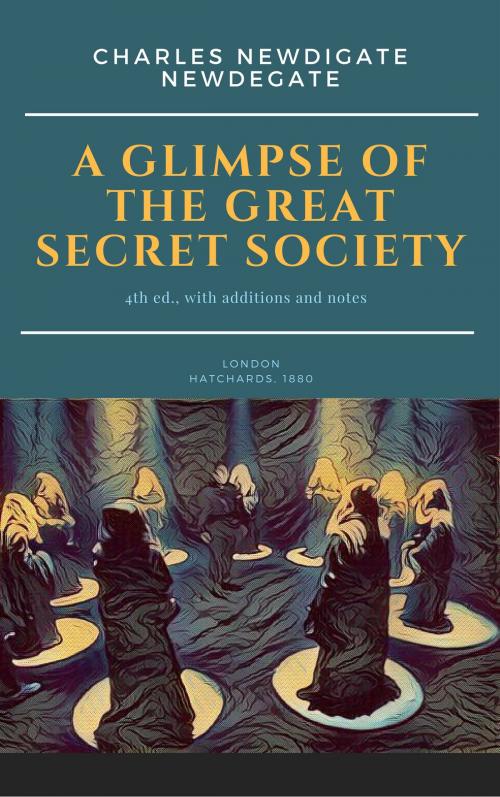A Glimpse of the Great Secret Society
Nonfiction, Religion & Spirituality, Christianity, Denominations, Catholic, Catholicism, Christian Life| Author: | Charles Newdigate Newdegate | ISBN: | 1230001792430 |
| Publisher: | London : Hatchards | Publication: | August 9, 2017 |
| Imprint: | 4th ed., with additions and notes | Language: | English |
| Author: | Charles Newdigate Newdegate |
| ISBN: | 1230001792430 |
| Publisher: | London : Hatchards |
| Publication: | August 9, 2017 |
| Imprint: | 4th ed., with additions and notes |
| Language: | English |
In addition to Freemasonry, European secret societies had a second organizational model: the Jesuit Order or, rather, the image constructed by its numerous opponents. Right from the beginning in 1540, the Jesuits caused suspicion even among coreligionists, and were accused of hypocrisy, fanaticism, and ambition. As missionary 'soldiers of the Pope' they became a symbol of the supranational pretensions of the Catholic Church; and since some of them had at one time defended tyrannicide, the violent death of any prince was invariably laid at their feet. The history of the Monita secreta mirrors the development of their reputation. A falsification first published in Cracow in 1614 and endlessly reprinted even today, the pamphlet was presented as the revelation of the secret instructions of the order known only to its leaders. A new version that appeared later in the century focused on how the Jesuits consciously and systematically strove for world domination. In this and other ways, they were increasingly depicted as a secret society with distinctly 'modern' traits - and one that was, moreover, exceedingly successful, even to the point where it became a source of inspiration for its enemies.
The Monita played a role when the Societas Jesu was forbidden in Portugal in 1759. In less than a decade, France, Spain, Naples, and Parma followed suit, and in 1773 Pope Clemens XIV disbanded the order. Yet among its opponents, initial joy was soon replaced by the fear that it was surreptitiously regrouping, making something that had been partly secret entirely invisible. In the German-speaking lands, voices were raised to suggest that the Jesuits were behind the organization of secret societies fighting Protestantism and the Enlightenment; and soon they were said to have infiltrated the lodges and conquered Freemasonry from the inside. This drew the attention of Count Mirabeau (1749-1791), the future president of the French National Assembly and himself a Mason, who discussed the German secret societies after a visit to Prussia in 1786-1787. He compared the Jesuits to the (already suppressed) Order of the Illuminati, stressing their value as an example; and in this, he not only followed in the footsteps of the first Illuminatus, but at the same time prefigured many a nineteenth-century conspirator.
In addition to Freemasonry, European secret societies had a second organizational model: the Jesuit Order or, rather, the image constructed by its numerous opponents. Right from the beginning in 1540, the Jesuits caused suspicion even among coreligionists, and were accused of hypocrisy, fanaticism, and ambition. As missionary 'soldiers of the Pope' they became a symbol of the supranational pretensions of the Catholic Church; and since some of them had at one time defended tyrannicide, the violent death of any prince was invariably laid at their feet. The history of the Monita secreta mirrors the development of their reputation. A falsification first published in Cracow in 1614 and endlessly reprinted even today, the pamphlet was presented as the revelation of the secret instructions of the order known only to its leaders. A new version that appeared later in the century focused on how the Jesuits consciously and systematically strove for world domination. In this and other ways, they were increasingly depicted as a secret society with distinctly 'modern' traits - and one that was, moreover, exceedingly successful, even to the point where it became a source of inspiration for its enemies.
The Monita played a role when the Societas Jesu was forbidden in Portugal in 1759. In less than a decade, France, Spain, Naples, and Parma followed suit, and in 1773 Pope Clemens XIV disbanded the order. Yet among its opponents, initial joy was soon replaced by the fear that it was surreptitiously regrouping, making something that had been partly secret entirely invisible. In the German-speaking lands, voices were raised to suggest that the Jesuits were behind the organization of secret societies fighting Protestantism and the Enlightenment; and soon they were said to have infiltrated the lodges and conquered Freemasonry from the inside. This drew the attention of Count Mirabeau (1749-1791), the future president of the French National Assembly and himself a Mason, who discussed the German secret societies after a visit to Prussia in 1786-1787. He compared the Jesuits to the (already suppressed) Order of the Illuminati, stressing their value as an example; and in this, he not only followed in the footsteps of the first Illuminatus, but at the same time prefigured many a nineteenth-century conspirator.















